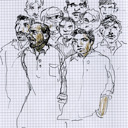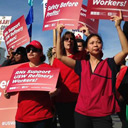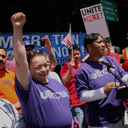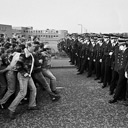
Worker centers have empowered nurses, nannies, busboys, taxi drivers, and many other low-wage immigrants long thought to be “unorganizable.” They provide clues to the future of organized labor—but can their victories scale up?

This May Day, we bring you voices from the streets of Baltimore and Long Beach—where unions are helping mobilize their communities against police terror and for economic justice—and from a West Coast Walmart, where activist Venanzi Luna has been leading the fight against union-busting. Plus: Whatever happened to the eight-hour day?

Following Wednesday’s nationwide protests for a living wage, Sarah and Michelle spoke with workers in New York and Atlanta about why they joined the Fight for $15 movement and what they hope it will achieve.

If there’s an engine that continues to draw millions of workers into the Persian Gulf’s draconian labor regime, it is the middlemen—the underground network of recruitment agents that reaches into every corner of rural South Asia, dangling the possibility of a better life before communities ravaged by neoliberalism.

Welcome to the main artery into creative or elite work—highly pressurized, poorly recompensed, sometimes exhilarating, more often menial. From the confluence of two grand movements in American history—the continued flight of women out of the home and into the workplace, and the rise of the “creative class”—the personal assistant is born.

Following last week’s Supreme Court decision that UPS had unfairly denied a pregnant worker reasonable accommodations on the job, Belabored talked with Melissa Josephs, from Women Employed, an Illinois-based organization that successfully campaigned for a new state law to protect pregnant worker’s rights, and Latavia Johnson, a Walmart worker in Illinois.

As “eds and meds” reshape working-class New Haven, labor and community groups are joining forces to transform the service economy and build a more democratic city.

What is the Trans-Pacific Partnership? It’s hard to know since the deal is being negotiated almost entirely in secret. Belabored talks with Celeste Drake, Trade & Globalization Policy Specialist at the AFL-CIO, about the ramifications of the trade deal for workers around the globe.

Lawmakers across the country are racing to pass so-called “right-to-work” legislation, the euphemistically named union-busting policy that restricts the collection of fees from all workers covered by a union contract. Belabored spoke with historian Elizabeth Shermer about the politics and history of right-to-work policies, and what labor can do to fight back.

When unionized oil workers at the Tesoro Golden Eagle plant in Martinez, California walked off the job on February 1 to demand safer working conditions, they received some unexpected company on the picket line. Since the beginning of the strike, …

Belabored talked with Ai-jen Poo talk about her new book, The Age of Dignity, her work organizing domestic workers, how care work is undervalued, and how racism and sexism contributed to the crisis in caring labor.

Since the 1990s, immigrant and labor activists in Los Angeles have worked together to build a powerful progressive movement.

U.S. oil workers are are on strike, in the largest walkout since 1980. Belabored talked with Steve Garey, president of United Steelworkers local 12-591 in Mount Vernon, WA, about worker safety, the decision to strike, and what’s at stake.

The popular 2014 film Pride neatly dramatizes how queer–labor solidarity during the miners’ strike pushed back against Margaret Thatcher’s combination of social conservatism and market nihilism.

What does the decline of stable working-class jobs mean for the working-class family? Belabored asks Andrew Cherlin, author of a new book, Labor’s Love Lost, on the rise and fall of the nuclear family in America, and how the workplace shapes our family life.





















